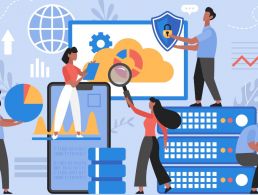We spoke to chief data scientist at Anaplan, Tal Segalov, about what he considers to be the ‘vital new computer skill’.
As we come to the end of Data Science Week here at Siliconrepublic.com, Anaplan’s Tal Segalov spoke to us about the skills needed for success in this field, and the great opportunities that can come from a career as a data scientist.
‘I think successful data scientists think bigger than their individual project or algorithm’
– TAL SEGALOV
First and foremost, why should people consider a career in data science?
Data science is the new vital computer skill and we are already seeing its impact across many different fields from sales and supply chain, marketing and social media, to life-critical applications in medical fields.
We are starting to build machines that can learn on their own how to handle a task by using the examples we show them, and we are trusting those machines to diagnose and recommend treatments – that’s data science!
I’ve worked across many disciplines and I still believe data science is one of the most interesting and most challenging fields – I continue to learn new things every day. The opportunities are diverse, and I am confident data science will continue to experience incredible growth in the future.
What are the most important skills needed to be a successful data scientist?
I feel lucky that my father taught me BASIC at a young age, not everyone has that. Now I speak computers natively and am still using those skills from my childhood to make strides in data science today.
While you do need to have a solid understanding of algorithms, statistics and related math fields, I think a big part of success in data science is constant curiosity. Asking questions like, ‘How do we articulate our results?’, ‘How do we improve performance?’, and ‘How do we reduce the amount of data needed?’ will help you dig into your product and its unique problems that need to be addressed in order to make it stronger.
I also think successful data scientists think bigger than their individual project or algorithm. They think about the best ways to enable non-data scientists to use the product and try to make their algorithm accessible to every system user. This makes data science impactful across the entire economy.
Tal Segalov, chief data scientist at Anaplan. Image: Anaplan
Are there any skills that people may not realise you need for data science, or ones that would be useful?
Successful data scientists need to be good communicators and have a willingness to learn from others. At Anaplan, we work on data science applications for specific lines of business, like marketing and sales. We are experts in data science, but not in those specific fields – so we must learn from the experts to get that domain knowledge.
We also have to listen and communicate with our amazing customers and partners to understand their specific needs and unlock the best way to address them. Being a data scientist doesn’t mean sitting alone with your computer all day. To create effective products, data scientists have to talk with field experts, customers and partners to make strong products that are impactful and can be used across the entire organisation, not just within the world of data science.
Where in the world is strongest for data skills and knowledge?
I think there is a lot of strong data science talent growing around the world. Early programmes that teach BASIC are becoming more readily available. In Israel, I participated in an organisation that is still helping students today. Programmes like this give young people a head start in learning and perfecting the necessary skills.
At Anaplan, we are excited about the growing pool of data science talent around the world. In June, we launched Anaplan University Connect. Through the programme, Anaplan works with universities around the globe to develop and deliver a model-building curriculum that incorporates the latest data science methods to modern business planning practices.
With valuable and real-world data analysis skills, students from the programme can have a competitive edge for seeking jobs within Anaplan’s fast-growing customer and partner ecosystem, which includes many global Fortune 500 companies.




